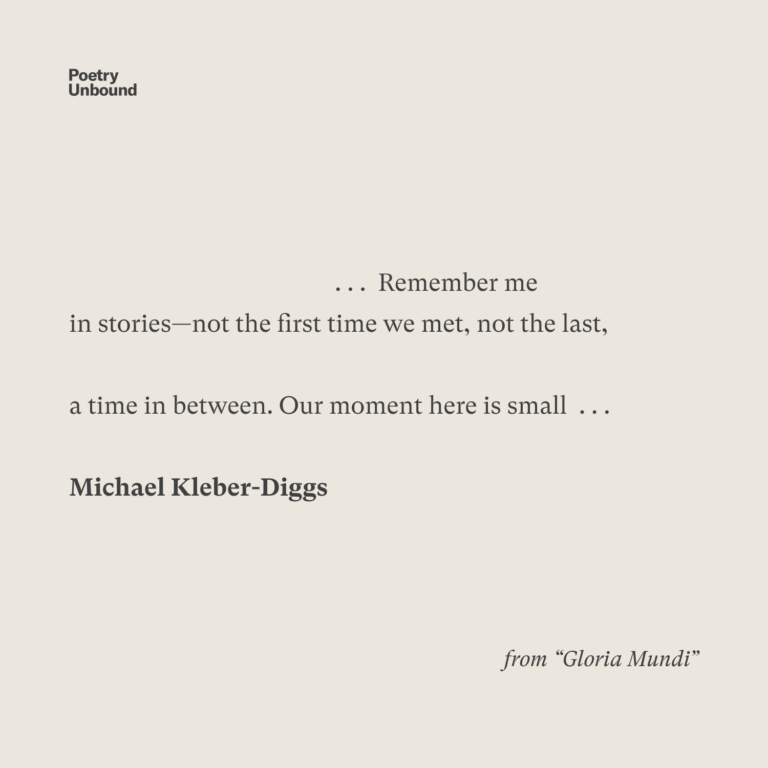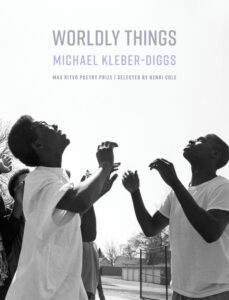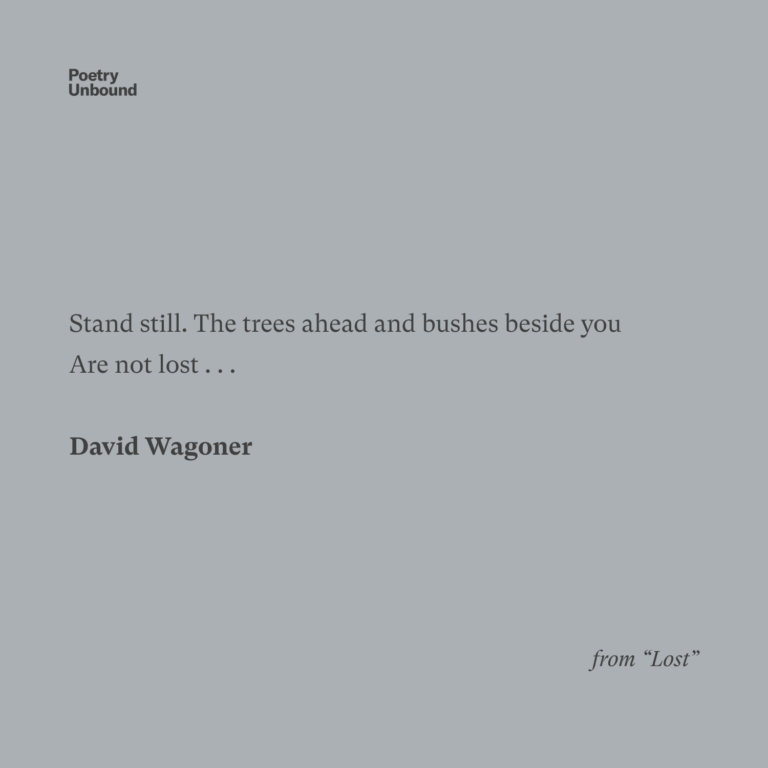Michael Kleber-Diggs
Gloria Mundi
Is there life after death? This poem says yes: where one life is part of a cycle of life that continues.
We’re pleased to offer Michael Kleber-Diggs’s poem, and invite you to connect with Poetry Unbound throughout this season.
Pre-order the forthcoming book Poetry Unbound: 50 Poems to Open Your World and join us in our new conversational space on Substack.

Guest

Michael Kleber-Diggs is a poet, essayist, literary critic, and arts educator. His debut poetry collection, Worldly Things (Milkweed Editions 2021), won the Max Ritvo Poetry Prize, the 2022 Hefner Heitz Kansas Book Award in Poetry, the 2022 Balcones Poetry Prize, and was a finalist for the 2022 Minnesota Book Award. Since 2016, Michael has been an instructor with the Minnesota Prison Writing Workshop. He also teaches Creative Writing in Augsburg University’s low-res MFA program and at Saint Paul Conservatory for Performing Artists.
Transcript
Pádraig Ó Tuama: Friends, thanks very much for listening to Poetry Unbound, whether you’re new or you’ve listened to them all — your attention makes everything worthwhile. And I’ve got some news: I’ve written a book, Poetry Unbound: 50 Poems to Open Your World. There’s 50 poems, each with a fresh essay written by me. I’d love it if you pre-order it, or pre-order a few, and join up to our free interactive newsletter. Links to everything at poetryunbound.org.
[music: “Praise the Rain” by Gautam Srikishan]
My name is Pádraig Ó Tuama, and a few years ago, at the start of COVID, a close friend died, somebody I had known since I was 11. And there was the first year, really, which was the shock of grief and the sadness and getting used to him not being around. I know not every grief is the same, but one of the things about certain griefs is that there can be gratitude on the other side of it: gratitude for having known this friend and loved him and been loved by him.
And a couple of weeks ago, on his anniversary, the second anniversary of his death, I went to a beach that he and I used to take walks on. And there was a woman swimming, and there was a dog, her dog, standing faithfully at the shore, waiting for her to come out. My friend loved dogs, and he would’ve sung a hymn of praise to this particular dog. And I watched the dog and sang a hymn of praise to him for helping me see these small moments of life. And this is a way that his legacy lives on in me. It’s not about what he’s achieved or the things that he did. It’s about the ways that he’s still living in me.
[music: “Praise the Rain” by Gautam Srikishan]
“Gloria Mundi” by Michael Kleber-Diggs:
“Come to my funeral dressed as you
would for an autumn walk in the woods.
“Arrive on your schedule; I give you permission
to be late, even without good cause.
“If my day arrives when you had other plans, please
proceed with them instead. Celebrate me
“there—keep dancing. Tend your gardens. Live
well. Don’t stop. Think of me forever assigned
“to a period, a place, a people. Remember me
in stories—not the first time we met, not the last,
“a time in between. Our moment here is small.
I am too—a worldly thing among worldly things—
“one part per seven billion. Make me smaller still.
Repurpose my body. Mix me with soil and seed,
“compost for a sapling. Make my remains useful,
wondrous. Let me bloom and recede, grow
“and decay, let me be lovely yet
temporal, like memories, like mahogany.”
[music: “First Grief, First Air” by Gautam Srikishan]
“Gloria Mundi” is the title of this poem — Latin, “the glory of the world.” And in many ways, the poem is one of honoring the Earth — soil and compost and seed, that useful, wondrous thing. And often this kind of Latin can be used in a religious setting, perhaps thinking of resurrection or reincarnation. But this poem is praising the Earth as a place where resurrection’s always happening, blooming and receding and growing and decaying. He is kind of writing an anti-legacy legacy poem. So many of the poems like this are trying to establish a legacy about how you could be remembered after your death. And he’s saying, My legacy is to be small, is to be smaller still.
He’s saying, I’m just “one part per seven billion,” and actually, “[m]ake me smaller.” Let me decompose. Let me be part of the compost. Don’t try to remember me in the great drama of things. It’s an extraordinary, humble poem, and it’s a poem of a deep ecology, and not just an ecology of soil and growth. It’s an ecology, too, of understanding the place of humanity within the ever changing world.
Instead of saying, Set up a temple to me, he’s saying, Let me be temporal. He’s not trying to evoke a poetic eternal life. He’s trying to say, Let me be part of the nutrient of the soil from which new things grow.
[music: “The Edge of All There Is” by Gautam Srikishan]
This poem is so generous — “Arrive on your schedule” — and if the idea of coming to a memorial doesn’t fit with your other plans, well then, just stay with your other plans: “keep dancing” or keep gardening or “[l]ive / well. Don’t stop.” Don’t interrupt.
And all of those demonstrate a great generosity of spirit, but they also communicate a particular relationship to time. And he doesn’t want to be made a pillar. What he is looking for is to be forgettable in a certain sense, which is also a relationship with time.
I even find myself speaking in alliteration whenever I read this poem or whenever I think about this poem, because the poem is filled with alliteration. It’s such a magnificent technique that he uses. “Think of me forever assigned // to a period, a place, a people,” — and then he goes on to say, “Mix me with soil and seed, // compost for a sapling. Make my remains useful / wondrous.” So many ways within which small musics are being established in this poem, none with a particular count, but the ways within which a small music of alliteration is established and then replaced by another music of alliteration and another — almost implies that little lives of sound are being established in the poem and then replaced by something else and replaced by another alliterative line and another alliterative line. The poem itself is allowing things to grow and die and grow and die. And in that, we see the beauty that he’s praising.
[music: “At Dusk” by Gautam Srikishan]
There’s a few parts in this poem where Michael Kleber-Diggs makes broad, declarative statements about the human experience: “Our moment here is small. / I am too—a worldly thing among worldly things— // one part per seven billion. Make me smaller still.” The title of the book from which this poem comes is called Worldly Things. And often that phrase — certainly how I encountered it, growing up, was imagining that “worldly things” are things that are not eternal things. You should follow what’s eternal and not worldly.
And Michael Kleber-Diggs turns that on its head by saying that we are all just “worldly things among worldly things” and that that’s a good thing, and therefore, we should be happy to be part of the soil of the future from which other worldly things will grow and be nurtured and be nourished.
This poem is really optimistic about the world. The world continues in this poem. You know, it blossoms and grows and decays and recedes and grows and decays again. He imagines an unfolding of the world where death and life are the natural cycle of it. There’s such deep wisdom in that, as well as deep challenge to a world that is often trying to pretend that we’re not dying, where powers are holding onto themself and the idea that they can prevent the natural reality of death from happening. And often, those powers do that by propagating tools and mechanisms of death. What Michael Kleber-Diggs is saying is that there is something that the Earth communicates to us about the nature of being alive, which is to recognize the reality of our own death. And this is part of the optimism of the poem. This is saying, So therefore, live. Don’t stop. Keep dancing, gardening. Don’t just think about things as their beginning and end. Remember the glorious and beautiful and simple and humble middle of the story, too. Let all of these things be the fruit of flourishing in the world.
[music: “At Dusk” by Gautam Srikishan]
One of the things this poem is doing is giving all kinds of permission. It’s explicit — “I give you permission / to be late, even without good cause.” And in such a generosity, it’s also saying, I give you permission to remember me or not, to grieve in the way that you wish to grieve, to know that your life, too, will be a house for the memories of me. And so many people have gone through so much grief in the last number of years, but also in the history of the world. There are so many ways within which we carry grief, and this poem is a glorious way to say memory, and dancing, and gardening, and the cycle of things, itself is a way of allowing grief to be part of our body and grief alongside life; that life itself is a testament to the life that’s come before, and grief can, eventually, look like joy. And he’s inviting people to wrap parts of what it might mean to remember him into a life well lived.
[music: “At Dusk” by Gautam Srikishan]
“Gloria Mundi” by Michael Kleber-Diggs:
“Come to my funeral dressed as you
would for an autumn walk in the woods.
“Arrive on your schedule; I give you permission
to be late, even without good cause.
“If my day arrives when you had other plans, please
proceed with them instead. Celebrate me
“there—keep dancing. Tend your gardens. Live
well. Don’t stop. Think of me forever assigned
“to a period, a place, a people. Remember me
in stories—not the first time we met, not the last,
“a time in between. Our moment here is small.
I am too—a worldly thing among worldly things—
“one part per seven billion. Make me smaller still.
Repurpose my body. Mix me with soil and seed,
“compost for a sapling. Make my remains useful,
wondrous. Let me bloom and recede, grow
“and decay, let me be lovely yet
temporal, like memories, like mahogany.”
[music: “Praise the Rain” by Gautam Srikishan]
Chris Heagle: “Gloria Mundi” comes from Michael Kleber-Diggs’s book Worldly Things. Thank you to Milkweed Editions, who gave us permission to use Michael’s poem. Read it on our website at onbeing.org.
[music: “Praise the Rain” by Gautam Srikishan]
Poetry Unbound is: Gautam Srikishan, Eddie Gonzalez, Lilian Vo, Lucas Johnson, Amy Chatelaine, Kayla Edwards, and me, Chris Heagle.
Our music is composed and provided by Gautam Srikishan and Blue Dot Sessions.
This podcast is produced by On Being Studios, which is located on Dakota land. Open your world to poetry with us by subscribing to our Substack newsletter at poetryunbound.org. You may also enjoy our other podcast On Being with Krista Tippett, or our newsletter, The Pause. Visit us at onbeing.org to find out more.
Books & Music
Recommended Reading
The On Being Project is an affiliate partner of Bookshop.org and Amazon.com. Any earnings we receive through these affiliate partnerships go into directly supporting The On Being Project.







